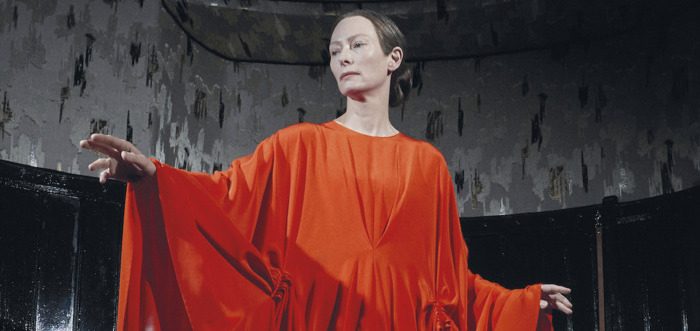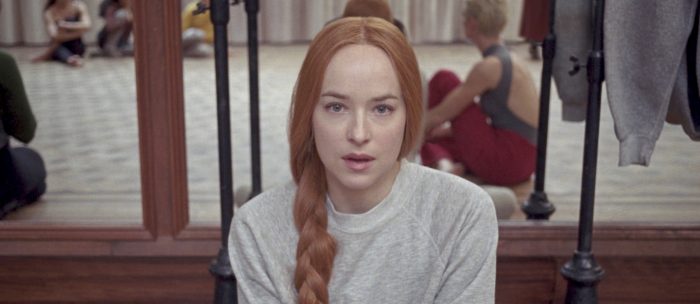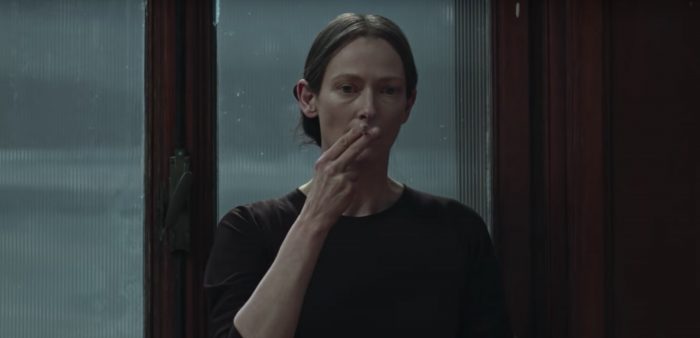The 4 Stages of Accepting ‘Suspiria,’ One of 2018’s Most Ambitious and Confounding Movies

In high school, I first heard the myth of the invisible ships. Perhaps you know it. It goes as such: When European explorers first discovered the Americas, their boats were so inconceivably large and foreign that the natives couldn’t comprehend them, and therefore couldn’t see them. The theory is based mostly on observations from the voyagers, who noted that natives failed to acknowledge the massive ships, and that even as they approached the shore they didn’t look up from what they were doing to take in the sight.
The theory is probably bogus, but has stuck with me since I first heard it, and popped back into my head when I saw Luca Guadagnino’s Suspiria remake at Fantastic Fest last month. A voyager’s massive ship and an experimental horror film are, circumstantially, pretty different; but the idea of being so utterly overwhelmed at the sight of something that you could barely comprehend it feels comparable. Suspiria isn’t a thing you look at once and understand. It’s a radical, carnal, enormous piece of work that took a lot of mediating, fire-stoking, and reflection to get to where I’m at now with the film. I imagine many viewers will have a similarly complicated experience.
That’s why I wanted to write out the stages of Suspiria acceptance that I went through after seeing the film, talking to its screenwriter David Kajganich, and witnessing the critical reactions pour in. I hope I can help others mount the beast that is Guadagnino’s insane masterwork. Let’s work the steps together.

Stage 1: Denial
I’m loosely modeling this piece on the well-known “five stages of grief,” a concept for processing personal loss. I don’t conflate watching a movie with losing a loved one, but for structural purposes, it comes in handy. For me, the first steps in both processes are the same: denial.
This denial came not in my disappointment that the film bears almost no similarity to the 1977 Dario Argento original, but that I didn’t have the immediate lustful obsession with it that I did Guadagnino’s last feature film, Call Me By Your Name. That movie struck up emotions welled so deeply in me that it was a near-religious experience, and has become — just a year after it’s release — one of my all-time favorite films. I felt an essential attachment to its emotions, its luxury, its intimacy. Knowing that he would next step into the horror realm — my favorite genre — had me salivating with anticipation.
But when the credits for Supsiria hit at Fantastic Fest — where it played as a secret screening for its North American debut — I didn’t feel elated. I didn’t feel moved. I didn’t feel all that satisfied at all, actually. There was something missing for me. Some key ingredient I couldn’t yet name. In the lobby of the Alamo Drafthouse, I listened to my critical peers rave, I saw their wildly enthusiastic tweets, I felt the buzz of excitement in the air; and also the fear. Am I going to be one of “those people” when it comes to this movie? The unhip buzzkill who rains on the festival praise parade?
Here’s where the denial comes in. I was in denial about everything. Denial about how I felt. Denial about the possibility that I maybe hated this movie. Denial that it contains some of the most lush and beautiful cinematography I’ve ever seen. Denial that I love that Susie Bannion was re-imagined as a repressed Midwestern Mennonite. All of these wildly conflicting and complicated emotions created a feeling I very rarely have walking out of a film: apathy.

Stage 2: Anger
When I feel apathetic, I often lean into the slightly stronger of the confused emotions and go with that. In this case, I leaned into anger about what the film wasn’t and the trend of reactions that I was seeing. While several women that I know flat-out adored the film, I noticed that male viewers were more hyperbolic with their praise. The conversations I had with women friends after the screening were slightly more prying. Many agreed with the things that annoyed me about the movie; largely, that it’s an incisively feminine story that lacks female energy.
I think I loved Call Me By Your Name so immediately because there was a baked-in authenticity that I wasn’t even aware of before I first viewed it. That story is about two queer men discovering their sexual identity in 1980s Italy. It was directed by an openly gay Italian man. It was written by an openly gay screenwriter, James Ivory. It features original music from Sufjan Stevens, who, while not officially out, is an icon in the gay community for his evocative, telling lyrics. The film received some controversy for casting straight actors as the leads, but nearly every other element of the larger storytelling was crafted by men with an intimate, personal awareness of the central emotions.
Suspiria, on the other hand, was written, directed, and scored by a man (Radiohead’s Thom Yorke). That’s not to say that men are incapable of or should not tell female stories; Annihilation, written and directed by Alex Garland, has one of the more touching depictions of female depression that I’ve ever seen. But sometimes that lack of representation is more deeply felt and more immediately isolating. If you’re a man, the world of Suspiria may look authentic. There are witches and dance scenes and hardly any men; Susie Bannion (Dakota Johnson) has female friendships, a rich backstory; the villains are women, and themes of motherhood are littered throughout.
And yet, all moments of female empowerment are undercut by something unintentionally off. As Susie, imbued with power, roams the halls of the Markos Dance Company late at night, it’s Thom Yorke’s voice that bellows over her journey. It drapes her glory moment in male energy, a metaphor for the chilly distance that exists between the women of this movie and the men who dared them to life.

Stage 3: Bargaining
But even with those initial misgivings, it was hard to keep Suspiria out of my head. Susie’s journey into the underworld of a prestigious Berlin dance company run by a coven of witches stuck in a devastating cycle of ritualistic tradition — all set against the backdrop of the German Autumn — is bursting with things to say. And despite that feeling of emotional distance, I did start to realize that the movie at least grapples with its gender politics in a meta way, through the character of Dr. Jozef Klemperer (played by Tilda Swinton in impressive prosthetics).
Klemperer — a psychotherapist who is made aware of the Markos coven by one of its students, his patient Patricia (Chloë Grace Moretz) — is an integral character in the film; in fact, his story bookends it. We learn more about him than perhaps even Susie; about his wife (Jessica Harper) who went missing during World War II, and the guilt he feels over her loss, and his role in the continued pain inflicted on the women in his orbit.
The day after the Fantastic Fest screening, I was able to sit down with screenwriter David Kajganich and actress Jessica Harper to discuss the film’s themes, including the idea that Klemperer is intentionally used as a meta way of framing the story through a male perspective, and how men continue to fail women by being passive witnesses to their horror.
“Aboslutely,” Kajganich said with enthusiasm when I brought this up. “Also, I think it’s to contrast the level of empowerment going on inside of the coven. This idea of a man who has never been empowered by what he’s seen, he can only hide, he can only convince himself that he’s done nothing wrong. Rather than taking the eye off of the power of women in the film, Klemperer’s arc was only functioning to strengthen his understanding of what was going on in the coven.”
Hearing Kajganich so elegantly discuss the importance of centralizing the power of the coven decontextualized some of my initial discomfort, and suddenly the idea of Klemperer’s failure and forgivingness felt fairly profound to me. It doesn’t erase all of my complaints, but it did let me in on how aware the male creators were in how they considered these things.
Kajganich also mentioned that one of his biggest influences when writing the script was West German director Rainer Werner Fassbinder, and how he looked to his female characters for inspiration. That comparison may not land so well with everyone, as Fassbinder was criticized throughout his short but prolific career for being misogynistic and homophobic; criticisms I’m familiar with but not enough versed in to have a solid opinion. (But that conversation did bring about a fun anecdote from Jessica Harper, who told me and Kajganich that she actually met Fassbinder on the set of the original Suspiria. They had dinner after filming one evening. “He ordered a baked potato topped with caviar,” she said.)
I left the interview with a renewed sense of excitement about this new Suspiria, anxious to see it again, and aware that it would be one of those movies. The ones you grow with and into and that may take years to fully work out what it means to you.

Stage 4: Acceptance
I’m skipping the fifth stage of the grieving process — depression — because it’s not true of my coming around on Suspiria, and it’s a bit strong to describe the reaction to any movie in my opinion. No, my experience with the film skipped directly to acceptance, with some caveats.
I still hold strong to some of my original complaints. I don’t like the score, I wish it had a more feminine touch — I wish the coven and dance troupe actually interacted the way women do, talked like women talk — and I’m not sure I’ll ever fully understand why Tilda Swinton needed to play Klemperer when her two other roles (one of which is a major spoiler) are more fascinating and far less distracting.
But I respect the film’s ambitions. I’m obsessed with much of its ugly beauty; the nightmarish visions Susie receives from the coven in her dreams; the beautiful and haunting dance routine costumed in red rope and aural distress; the blanched color palette that makes the unrest of German Autumn palatable. It’s an impressive, grand, messy, imperfect movie; but I’m happy as hell that it exists, and I can’t wait to talk about it for the rest of the year. The boat’s mirage is starting to coalesce.
The post The 4 Stages of Accepting ‘Suspiria,’ One of 2018’s Most Ambitious and Confounding Movies appeared first on /Film.
from /Film https://ift.tt/2qoTJBP
No comments: